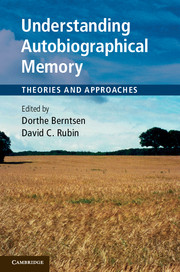Book contents
- Frontmatter
- Contents
- List of figures
- List of tables
- List of contributors
- Preface
- Acknowledgements
- 1 Introduction
- Part I Approaches to the study of autobiographical memory
- Part II Neural studies of autobiographical memory
- Part III Social and cultural aspects of autobiographical memory
- Part IV Development of autobiographical memory from infancy to old age
- 11 The life I once remembered: the waxing and waning of early memories
- 12 Subjective perspective and personal timeline in the development of autobiographical memory
- 13 Theory and research in autobiographical memory: a life-span developmental perspective
- Part V Evolution and basic processes of autobiographical memory
- Part VI Discussion
- Index
- References
11 - The life I once remembered: the waxing and waning of early memories
Published online by Cambridge University Press: 05 November 2012
- Frontmatter
- Contents
- List of figures
- List of tables
- List of contributors
- Preface
- Acknowledgements
- 1 Introduction
- Part I Approaches to the study of autobiographical memory
- Part II Neural studies of autobiographical memory
- Part III Social and cultural aspects of autobiographical memory
- Part IV Development of autobiographical memory from infancy to old age
- 11 The life I once remembered: the waxing and waning of early memories
- 12 Subjective perspective and personal timeline in the development of autobiographical memory
- 13 Theory and research in autobiographical memory: a life-span developmental perspective
- Part V Evolution and basic processes of autobiographical memory
- Part VI Discussion
- Index
- References
Summary
One of the most intriguing phenomena in the memory literature is infantile or childhood amnesia. The amnesia has two components: a relative paucity among adults of memories of specific past events from the first 3 to 4 years of life, and from the ages of 3 or 4 to age 7 or 8, a smaller number of memories than would be expected on the basis of forgetting alone (Pillemer and White, 1989). The amnesia made its debut in the psychological literature in 1893, with a report by C. Miles on adults’ responses to a questionnaire designed to gain information about the phenomenal experience of childhood. One of the questions included in the survey was, “What is the earliest thing you are sure you can remember? How old were you?” The average earliest memory of Miles’ 89 respondents was age 3.04 years. The amnesia was named in 1905 by Sigmund Freud, who remarked on “the peculiar amnesia which veils from most people (not from all) the first years of their childhood, usually the first six or eight years” (1905/1953, p. 581). For much of the twentieth century, efforts were made to describe the amnesia by characterizing adults’ earliest memories along dimensions of detail and completeness (highly detailed or fragmentary), perspective (first or third person), emotionality (predominantly positive, negative, or devoid of emotion), and so forth (see, e.g., Bauer, 2007; White and Pillemer, 1979, for reviews). Explanatory accounts ranged from theories of repression and “screening” of psychically unacceptable recollections (Freud, 1905/1953) to cognitive theories characterizing the ability to remember specific past events as a developmentally late achievement due to changes in representational processes (Piaget, 1962), or non-mnemonic developments, such as the dawning of autonoetic awareness (e.g., Perner and Ruffman, 1995), for example. Largely missing from the literature, however, were data on the memories of children within the age period eventually veiled by the amnesia. As a result, there was little to constrain accounts of the origins or development of the amnesia.
- Type
- Chapter
- Information
- Understanding Autobiographical MemoryTheories and Approaches, pp. 205 - 225Publisher: Cambridge University PressPrint publication year: 2012
References
- 9
- Cited by



